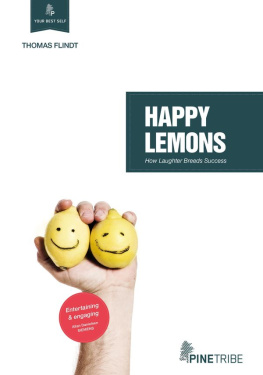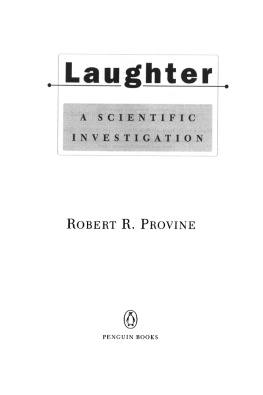Introduction: Then the laughter started - the story ofthe Four Systems experiment
Ive been working with laughter for more than ten years now. Aftera year working with laughter, I felt that it had made such anenormous difference to my life, and that it could make such anenormous difference to other peoples lives, that the time had comefor me to document some of the facts and claims that I based mylectures on.
I had been telling my audiences that laughter was the bestremedy for stress, and how we create contact with the presentmoment and each other when we laugh together. I had described howlaughter makes us fit for fight, more motivated and receptive,and how a good laugh can neutralise narratives that belong to thepast and future, allowing us to see each other as we are, rightnow.
I had often said that being able to have a good laughtogether improves communication and cooperation between people.However, it is one thing to have read about these theories, it isanother thing to be able to talk about them from the perspective ofyour own documented experience.
I made a decision to find a company that I could work withfor an extended period of time. My idea was this: to start everyworking day with 10-20 minutes of laughter for all the companysemployees. Over the course of a month, we would measure how thehealth of the company and the employees could be improved throughthe practice of laughter. I was certain that it would be a majorsuccess.
At my next presentation I shared my plans to scientificallydocument the beneficial effects my group were feeling and the factthat I was looking for a business with which to work on thisexperiment. A man I would come to know as Christoffer Witt Quistinstantly raised his hand and said, Count us in!. Christoffer wasthe director and owner of an IT firm near Copenhagen, Denmark,called Four Systems. I left the bright smiles andappreciative applause of this happy gathering. It was dark outsidein the parking lot, but the night sky was perfectly clear andfilled with stars. I stood for a moment and looked up at the stars.They spoke their own language. I had this powerful intuition thatthis - with Christoffers card in my pocket - was thestart of something big.
How laughter changed mylife.
Ive spent a decade helping people use laughter to change theirlives, so it makes sense that I tell you where it all began, andhow laughter changed my life.
I grew up in a wonderful happy family, in a town just northof Copenhagen. My father, a man I admire a great deal, ran asupermarket. When I grew up, I followed in his footsteps andtrained as a grocer. Deep down, I knew that this wasnt the rightthing for me so as the years passed I became unhappier andunhappier, and angrier and more bitter, until I received the mostincredible gift I got fired!
I went back to school, and felt my creativity start to unfurland flourish as I began painting and writing poetry. I was lucky tohave an incredibly inspirational mentor, the language teacher,writer and Marilyn Monroe expert, Bo Tao Michaelis. His artisticand entertaining style of teaching (which he called Taos TotalShow) helped awaken my own desire to communicate and toteach.
Inspired by his example, I trained as a teacher, and aftersome years studying the theory and practice of human development(at university and in the classroom with my students!) I decided totake what I had learned and use it for the education andenlightenment of adults. At a training session one day, I happenedupon a laughter workshop.
In that hour, I experienced all the values I wished for inlife, and all those I wanted to share with others, coming to me oneby one, like pearls threaded on a string, through an intenseimmersion in laughter. I felt a vivid presence and awareness withinmyself, and a great love for myself and for those laughing with me.I experienced a deep contact with life itself. I experienced truefreedom.
There is a sense of magic in laughter, and I knew my life hadbeen touched by it. I knew that I had encountered somethingincredibly special, and that I had to share it with everyone. Notlong after that, I handed in my notice as a teacher and devotedmyself to the path of laughter.
Morning laughter
- With the cooperation of Four Systems, I planned to measure the mental and physical rewards of starting the day with 10-20 minutes of laughter.
- How would it affect each individual worker and what would it mean for cooperation, communication and social relations in the workplace?
- How would it influence the company in the long term?
- Would starting each morning in this way influence the rest of the working day?
And would 10-20 minutes of morning laughter perhaps affectthe working environment in other ways?
In April 2004, I held an introductory evening for all of theFour Systems employees. They gave the project the thumbs up,agreeing to laugh together every working day throughout the monthof May. Before we started, all the employees were asked to fill outa questionnaire about their physical and psychological workingenvironment. They responded to questions about cooperation andcommunication, quality of social relations and level of personalwellbeing, and made evaluations of the workplace as awhole.
Stress test
Prior to the start of our course, stress researcher AndersLonedahl, from the Karolinska Institute in Stockholm, Sweden,visited the company. I had met Anders earlier that year in acompletely different context, where I had happened to mention myidea and he had expressed his interest in becoming involved.Lonedahl came to Four Systems early in the morning on May3rd and stress-tested four randomly selectedemployees.
Lonedahl measured their blood pressure, pulse and carbondioxide (CO2) exhalation levels. When we are stressed, weaccumulate CO 2 in the body and the levelsof it that we exhale decrease. All four employees tested as havingtoo high a pulse rate and blood pressure, and too low a level ofexhaled CO 2 . Psychological testing revealedthat all four were exhibiting stress behaviour.













